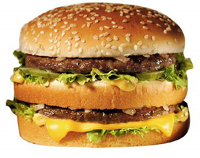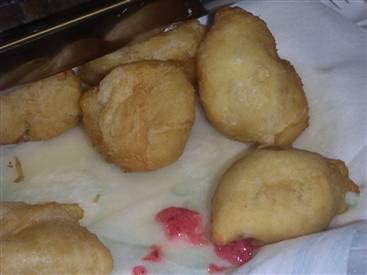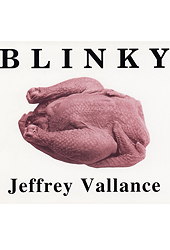Food
The End of McDonald’s! (In Iceland)

Posted By: Nethie - Sat Oct 31, 2009 -
Comments (7)
Category: Food, Restaurants, Europe
Follies of the Mad Men #74

[From Good Housekeeping for December 1949.]
"Subliminal" is not the precise word I want here. Not when the coded message is in big red letters.
"Subtextual?" "Off-topic?" "Suggestive?"
In any case, promoting the maxim "husbands beat wives" in a women's magazine was one way of keeping the girls in line, I guess.
Posted By: Paul - Sun Oct 25, 2009 -
Comments (4)
Category: Business, Advertising, Products, Domestic, Marriage, Food, Violence, Husbands, Wives, 1940s
All Hail Marshmallow Fluff!
Every year the people of Massachusetts celebrate one of their most noble products, Marshmallow Fluff, in a festival called "What the Fluff." A prime component of the festival are the dancers known as the Flufferettes. Watch them below, then take a tour of the Fluff factory.Read about the latest festival here.
Posted By: Paul - Sun Sep 27, 2009 -
Comments (5)
Category: Food, Parades and Festivals, Regionalism, North America
Deep Fried Butter
I don't have the calorie count, but I'm guessing this product can't be too healthy. Still, I want some. Here's the link:http://www.msnbc.msn.com/id/32665106/ns/today-today_food_and_wine/
I really want the grape flavored one.

Posted By: gdanea - Fri Sep 04, 2009 -
Comments (4)
Category: Food
Tactical Canned Bacon

You now never have to worry about having bacon handy after the apocalypse with Tactical Canned Bacon. The bacon, which has a shelf life of ten plus years, is being sold over at Think Geek. The nine ounce cans contains fifty four slices of highly preserved crispy pieces of bacon.
Posted By: mdb777 - Fri Sep 04, 2009 -
Comments (3)
Category: Food
Good Wrinkles
A twenty-minute cartoon about prunes? Now, that's weird!
Posted By: Paul - Tue Sep 01, 2009 -
Comments (4)
Category: Food, Cartoons, Documentaries, 1950s
Another Helping of Food Related Weirdness - 4
But if there is one food that might possibly challenge bacon as the mightily meaty master of my heart, it would be southern fried chicken. So what could be better than a sandwich that includes both? Well, how about one that leaves out that pointless bread stuff and puts the slices of gorgeous bacon between two hot, fresh fried chicken fillets? That is the idea behind what some reports are claiming is the latest creation from KFC, the “double-down” sandwich. Bacon, cheese and the “Colonel’s special sauce” are sandwiched between the chain’s house-style fried chicken in a heart-stopping 1200 calorie mouthful. And the day this launches near me officially marks the end of my banana diet (AJC).
More in extended >>
Posted By: Dumbfounded - Wed Aug 26, 2009 -
Comments (8)
Category: Agriculture, Animals, Cops, Exercise and Fitness, Food, Candy, Guns
Badger Casserole
It's all badgers, all the time, here at WU!
Posted By: Paul - Tue Jul 28, 2009 -
Comments (2)
Category: Animals, Food, Transportation
Chocolate Just Got Better!

FYI: Chocolate was, as everyone knows, invented/discovered by the Aztecs. But what is less well known is that they did so at least 3000 years ago, and were probably trying to make beer. Anthropologists John Henderson, of Cornell University, and Rosemary Joyce, of University of California, discovered cacao residues on pottery vessels dating back to 1000 BCE that are believed to be from a drink formed by fermenting the pulp and seeds (PNAS).
(Image by Wikipedia.)
Posted By: Dumbfounded - Fri Jul 17, 2009 -
Comments (20)
Category: Food, Candy, Nutrition, History, Archaeology, Products
Got Milk?
Let's have a vote. Is this commercial supposed make you thirsty for milk, or make you laugh milk out of your nose?
Posted By: fyshstyxx - Fri Jul 17, 2009 -
Comments (10)
Category: Food, Television, Asia

| Who We Are |
|---|
| Alex Boese Alex is the creator and curator of the Museum of Hoaxes. He's also the author of various weird, non-fiction, science-themed books such as Elephants on Acid and Psychedelic Apes. Paul Di Filippo Paul has been paid to put weird ideas into fictional form for over thirty years, in his career as a noted science fiction writer. He has recently begun blogging on many curious topics with three fellow writers at The Inferior 4+1. Contact Us |




